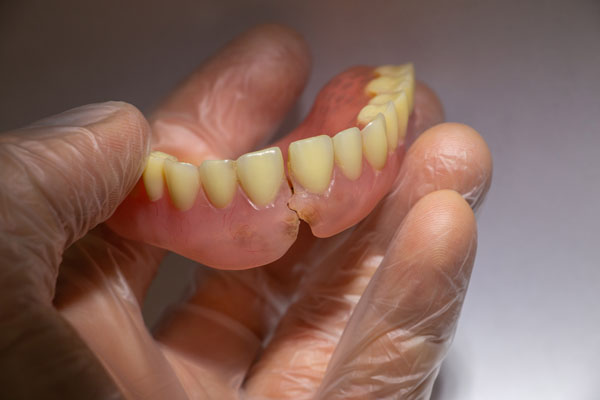 Denture repairs are often possible for broken dentures, which saves patients time and money that would otherwise be spent on replacing their dentures. This review discusses when denture repairs are an option for breaks, how the repair process works, and when a replacement may be recommended by a dentist.
Denture repairs are often possible for broken dentures, which saves patients time and money that would otherwise be spent on replacing their dentures. This review discusses when denture repairs are an option for breaks, how the repair process works, and when a replacement may be recommended by a dentist.
Everything to know about denture repairs for broken dentures
Denture repairs involve processes that aim to restore the optimal function, appearance, and fit of your dentures after damage occurs. Depending on the type and severity of the break, you may be eligible for a denture repair.
Can broken dentures be repaired?
Broken dentures can be repaired in many cases when the extent of the damage is not severe. For example, your dentist can likely repair dentures that are worn down from chewing and grinding, stained due to their age, or have a small chip or crack. A dentist can assess the severity of the damage during a consultation and provide a recommendation as to whether dentures repair or replacement is more appropriate.
How do denture repairs work for broken dentures?
There are different types of denture repairs. The one that is right for your dentures depends on the severity, type, and location of the break. For minor damage, all that may be required is an in-office general repair to repair the damaged portion. For more severe breaks that weaken or damage the structural integrity of the dentures, a denture rebasing or denture relining may be a more appropriate solution, which often involves sending the dentures to the laboratory.
Dentures can repair a range of types of broken dentures. The most common types of damage that a dentist can help repair with dentures include:
- Chips
- Cracks
- Warping
- Stains
- Worn-down teeth
Anytime your dentures are damaged in a manner that affects the comfort, overall fit, or appearance of the dentures, it is recommended to visit a dentist to determine if repair is necessary.
When are broken dentures not able to be repaired?
Dentists typically recommend denture repair when the same level of benefit can be derived from a repair and it saves the patient money and time. However, dentists may recommend a denture replacement if the damage is beyond what can be repaired or if replacing can save the patient time and money.
How long can I expect my dentures to last?
Dentures last at least five years in most cases. In fact, some patients are able to keep their dentures in ideal condition for more than a decade when they care for them properly. Your dentist can assess the condition of your dentures with each check-up visit.
Contact us by phone to schedule a denture repair consultation
No one should have to wear broken dentures or dentures that do not look or fit just right each day. Here at our dental practice, we help ensure that our patients always have reliable and comfortable dentures that give them confidence and allow them to function in an optimal manner each day.
Request an appointment or call Dentistry for Woodstock at 770-238-1437 for an appointment in our Woodstock office.
Recent Posts
Monitoring and denture adjustments allow your dentures to remain useful and comfortable throughout their lifespan. These proactive measures enable your prosthetic teeth to mimic the function of natural teeth without the discomfort of slippage and injury. Here is how denture adjustments can solve common problems that come up when you live with dentures.Dental prosthetics like…
You might not expect to need denture adjustments after being fitted for a brand-new set of dentures. However, even a new appliance might need adjusting early on.During the first month, it is essential to pay careful attention to the comfort and feel of your new dental prosthetic. It is normal to experience an adjustment period…
You will need one or more denture adjustments as your jawbone and gums change. This is why dentists and prosthodontists recommend regular checkups — to track the gradual changes in your mouth. The type of adjustment that your dentures need will depend on their structural soundness. It will also depend on the difference between the…


